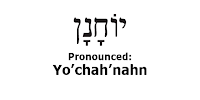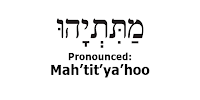Choosing a Hebrew Name
When naming a child, parents are often faced with a great deal of outside pressure. Family, friends, co-workers--everybody has an opinion. Stressed-out parents should feel some relief knowing that, according to Jewish tradition, parents have ruach hakodesh, Divine inspiration, when choosing a name.
In most Sephardi communities, it is customary to name children after grandparents (or relatives other than parents) either living or dead. In fact, there is even a preferred order: the first child is named after a paternal grandparent, the second after a maternal grandparent (a living grandparent may forgo the honor if they wish). The source for this custom in Genesis 38, when Jacob’s son Judah marries. The Torah explicitly states that Judah chose the name of the first child and his wife chose the name of the second.
This verse is also the source of the common Ashkenazi custom that the father names the first child, the mother names the second, and they continue to alternate. It is interesting to note, however, that some Ashkenazi communities reverse the order, with the mother naming the first child and the father the second. Of course, it is best that parents should be in agreement each time. Ashkenazim do not name children after living relatives.
It is also a common custom to name children after rabbis or other righteous people/role models.
In addition to family names, many people choose names based on when the child was born, using either a holiday or the Torah portion of the week as a source. For instance, a girl born close to Purim might be called Esther or a boy born during the week of Parashat Lech Lecha, might be called Abraham.
Of course, this is the parents’ choice. They can simply choose a name that they like. Names can come from the Torah, Jewish history or modern Israeli Hebrew. There are also family names rooted in Yiddish or Ladino. There is only one rule that must be followed: one is not supposed to give a child a name that will cause the child shame.
A secondary aspect of this rule is that a boy should not be given a girl’s name. This is a specific rule applying to a name, since many may be wondering about naming in honor/memory of someone of the opposite gender. For instance, a boy being named Samuel after his Great-Aunt Sally.
Naming in honor/memory of a relative has two purposes. The first is that the person one is naming after has outstanding attributes which the parents hope that their child will also have. If this is the goal of the chosen name, then the child should be given that exact name. If the great-grandmother was Sarah Bluma, the daughter should be named Sarah Bluma, and it is preferable that the full name be used.
The second reason for reason for naming after someone is to honor him/her (if Sephardi) or his/her memory, or for purposes of peace within the family. In cases such as this people will use part of a name (i.e.: the first of two names) or will translate a Yiddish or colloquial name into Hebrew (Raizel becomes Shoshana, Elizabeth becomes Elisheva). This is also the situation in which we find people using the same first letter, for instance naming a boy Baruch after Grandpa Bob or Grandma Breindy.
If the person died young (speak to your local rabbi, some consider young to be under the age of 60), it may be considered appropriate to alter the name somewhat or to add a name, such as Chaim or Chaya (which both refer to life).
DISCOVER the source and history of 25 Hebrew-based names that made it to the U.S. Social Security's top 100 names list for both boys and girls! (A new name will be posted each weekday from October 31 - December 1.)
In most Sephardi communities, it is customary to name children after grandparents (or relatives other than parents) either living or dead. In fact, there is even a preferred order: the first child is named after a paternal grandparent, the second after a maternal grandparent (a living grandparent may forgo the honor if they wish). The source for this custom in Genesis 38, when Jacob’s son Judah marries. The Torah explicitly states that Judah chose the name of the first child and his wife chose the name of the second.
This verse is also the source of the common Ashkenazi custom that the father names the first child, the mother names the second, and they continue to alternate. It is interesting to note, however, that some Ashkenazi communities reverse the order, with the mother naming the first child and the father the second. Of course, it is best that parents should be in agreement each time. Ashkenazim do not name children after living relatives.
It is also a common custom to name children after rabbis or other righteous people/role models.
In addition to family names, many people choose names based on when the child was born, using either a holiday or the Torah portion of the week as a source. For instance, a girl born close to Purim might be called Esther or a boy born during the week of Parashat Lech Lecha, might be called Abraham.
Of course, this is the parents’ choice. They can simply choose a name that they like. Names can come from the Torah, Jewish history or modern Israeli Hebrew. There are also family names rooted in Yiddish or Ladino. There is only one rule that must be followed: one is not supposed to give a child a name that will cause the child shame.
A secondary aspect of this rule is that a boy should not be given a girl’s name. This is a specific rule applying to a name, since many may be wondering about naming in honor/memory of someone of the opposite gender. For instance, a boy being named Samuel after his Great-Aunt Sally.
Naming in honor/memory of a relative has two purposes. The first is that the person one is naming after has outstanding attributes which the parents hope that their child will also have. If this is the goal of the chosen name, then the child should be given that exact name. If the great-grandmother was Sarah Bluma, the daughter should be named Sarah Bluma, and it is preferable that the full name be used.
The second reason for reason for naming after someone is to honor him/her (if Sephardi) or his/her memory, or for purposes of peace within the family. In cases such as this people will use part of a name (i.e.: the first of two names) or will translate a Yiddish or colloquial name into Hebrew (Raizel becomes Shoshana, Elizabeth becomes Elisheva). This is also the situation in which we find people using the same first letter, for instance naming a boy Baruch after Grandpa Bob or Grandma Breindy.
If the person died young (speak to your local rabbi, some consider young to be under the age of 60), it may be considered appropriate to alter the name somewhat or to add a name, such as Chaim or Chaya (which both refer to life).
DISCOVER the source and history of 25 Hebrew-based names that made it to the U.S. Social Security's top 100 names list for both boys and girls! (A new name will be posted each weekday from October 31 - December 1.)


Comments
Post a Comment